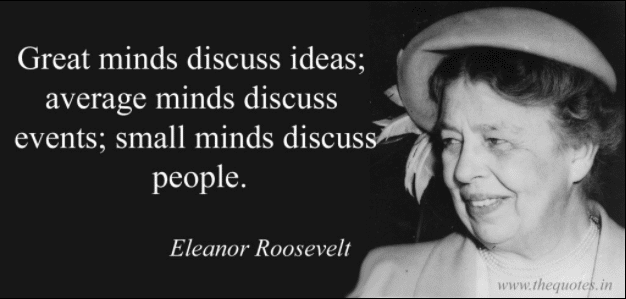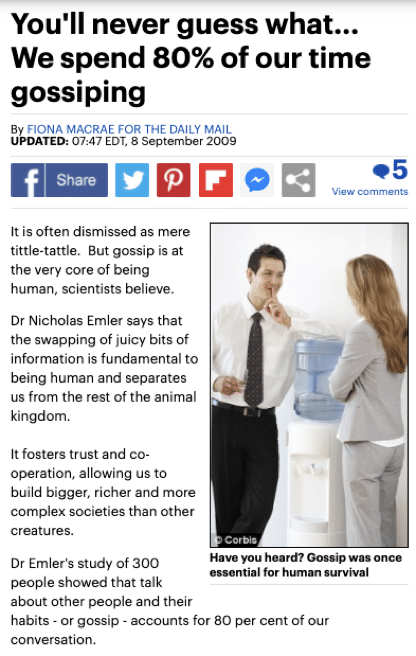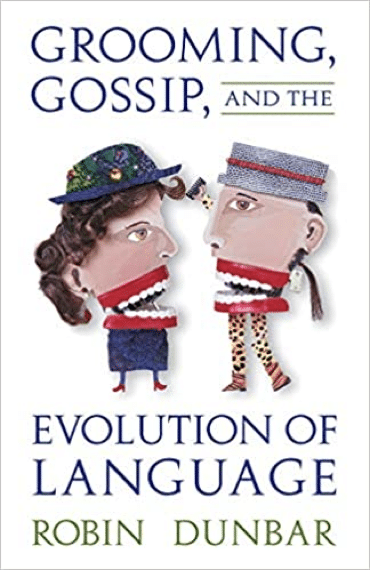
You probably read this and thought: that’s an unrealistic expectation.
Kind of like expecting an ad to “go viral.”
Who gossips about ads, of all things?
And why would anyone want people gossiping about their brand?
Understandable reactions, but also wrong, due to a fundamental misunderstanding of gossip.
The Truth About Gossip
There are two essential and astonishing facts that’ll revolutionize your understanding of gossip:
Fact #1: Gossip makes up 80% of our conversations
Fact #2: 95% of gossip is positive
Isn’t that totally opposite of what you think of when you think about gossip?
For most people the word “gossip” conjures images of catty, mean-girls engaged in social bullying and one-upmanship games.
A sensibility memorably expressed by Eleanor Roosevelt:

But the truth is that ALL minds discuss people as the majority of what they talk about.
This is hardwired behavior necessary for survival.
If two people are talking, they’ll tend to be talking about other people.
This is as commonplace as meeting up with a friend and asking about their wife and kids.
Or listening to a buddy’s work story involving their colleagues.
Can you see how NOT gossiping would leave you as a social outcast?
And how most gossip is, in fact, positive rather than negative?
So why do most people presume gossip to be catty and destructive?
Gossip as Superpower
To understand gossip, you have to understand what happens in communities without gossip.
And since all humans gossip, that means looking at animal communities. Specifically chimps.
Chimps have complex social societies, complete with family structures, politics, and power struggles.
But their societies are limited to 50 chimps or less.
 Why? Because chimps can’t gossip.
Why? Because chimps can’t gossip.
Basically, social structure relies on social trust. But social trust leaves group members open to bad actors.
If bad actors aren’t discovered and socially outcast soon enough, social trust dies, along with the social structure.
Because chimps don’t gossip, they don’t form opinions about other chimps apart from direct observation.
No chimp has a reputation that precedes him.
Chimps only work on a one-degree-of-association basis when it comes to judging other chimps.
And that severely limits the maximum size of a chimp society.
Humans, on the other hand, gossip.
Using gossip, we form opinions about people we’ve never met through the stories we hear about them.
And that lets us hear about — and punish! — bad actors with social exclusion before they can destroy social trust and take down the group.
To quote Dr. Nicholas Elmer, who’s studies produced the facts stated above:
“Baboons and chimps have complex societies because individuals know a lot about each other.
But because they cannot talk they rely on direct observations and so they are limited to groups of around 50.
The one thing that sets us apart is that we can talk to each other. We can exchange social information. We can form much more complex societies than other animals because we affectively gossip.
In fact it is gossip that sets us apart from other animals. It is fundamental to being human. It allows us to know about people that we have never met.
It is absolutely fundamental to human society.
You can only see and observe a certain amount. With gossip you can know about 100,000 people without knowing them.”
So while most gossip is positive, the 5% of negative gossip remains crucial.
After all, the point to “knowing” people you’ve never met is knowing who not to trust without having to learn it the hard way.
With the flip side of learning who can be trusted without having to risk betrayal.
So most gossip is indeed positive (within a functioning society), but we are hardwired to pay the most attention to negative gossip because it’s the most important to our survival within the group.
Gossip and Parasocial Influence
Are you beginning to see the benefits of harnessing the hardwired nature of gossip for your advertising efforts?
Gossip allows customers to know and trust people they’ve never met.
As in prospective customers knowing and trusting your business before they’ve ever done business with you.
And when you magnify the magic of gossip with the reach of mass media, you can supercharge the results.
Proof of this exists in what psychologists call “parasocial relationships.”
A parasocial relationship is the one-sided friendship fans have with celebrities. And the best introduction to this phenomenon I’ve seen is this Vox video:
In other words, when your ads engage in gossipy self-disclosure, rather than hard sell, they have the ability to create parasocial relationships with prospective customers.
What better way to win the sale before it ever starts.
And isn’t that the entire point of branding?
So why not cheat with your branding efforts? Why not harness the power of Gossip to make your ads that much more effective?
Now all you need to know is how harness that power.
Gossip and Advertising
 Robin Dunbar is the current head of the Social and Evolutionary Neuroscience Research Group at the University of Oxford.
Robin Dunbar is the current head of the Social and Evolutionary Neuroscience Research Group at the University of Oxford.
And according to Dunbar, there are 4 main Categories of Gossip:
- Whether people were keeping their social commitments to other individuals in their social network;
- Bragging about themselves as a romantic partner, friend, or ally;
- Seeking advice;
- Condemning slackers or free loaders.
And I invite you to mentally classify the posts you see the next time you scroll through your social media feed.
You’ll likely immediately see the intent behind the posts and find that they fit into one or more of these categories with astounding regularity.
But you’ll also see that most bragging isn’t overt, with the brag implied rather than stated.
A picture of a fabulous family vacation, or attendance at a charity ball is indeed a form of social sharing.
It even shows a certain amount of keeping up with social commitments.
But the visuals are still imprinting the brag about what a great parent, partner, or ally you are — with the likes and comments serving as “social proof.”
Of course, it’s even better when it’s combined with a bit of self-deprecation, say showing a picture of you and your family doing something goofy, while on that vacation.
A little vulnerability to soften the edges of the brag.
And maybe a humorous caption with sentiment or irony.
If your ads follow that format rather than a yell-and-sell format, you’ll be well on your way to incorporating the power of gossip into your advertising.
And for those looking for more of a checklist than a theoretical example:
-
- Tell stories.
- Especially your genesis story.
- Make your brags implied
- Practice self disclosure and vulnerability.
- Don’t be afraid to make comparisons
- Throw in just a dash of condemnation for slackers and freeloaders.
2 Gossipy — And Great! — Ad Campaigns
So by now you’re probably wondering what a Gossip-Driven ad campaign looks like.
Well, let’s take a look at two TV campaigns by the late and legendary ad genius, Hal Riney.
First, take a gander at these ads for Henry Weinhard’s Private Reserve:
Note how each ad is story-driven.
They’re little urban legends about the silly, and maybe a bit outrageous, lengths that fans of the beer will go to in order to get their fix.
“If it’s worth _______, it sure must be worth a trip to the store.”
Lots of social proof going on in those stories.
But notice how the brag is implied by the actions of the characters in the stories.
And how the humor softens the edges.
Yet, while the ads are great and drove sales of the beer, they are missing something.
They’re missing an ongoing character or spokesperson for people to bond to and develop a parasocial relationship with.
Maybe that’s why Hal Riney moved to a character-driven style of ads when promoting Bartles & Jaymes.
Just feast your eyes on the first ad to launch the campaign:
And then check out a compilation of follow-up ads:
The Weinhard ads were successful, but the Bartles & Jaymes ads were a grand slam phenomena.
They made the product king of their category, and the campaign lasted so long that Hal Riney eventually wrote and produced 150 ads in that series.
But notice the vulnerability in the ads. Right off the bat, Bartles tells us how Jaymes took out a 2nd mortgage on his home to produce the wine coolers.
Also, note how these ads are long-form storytelling (rather than the purely episodic format used in the Weinhard ads), with the storyline for most ads building off of the previous commercial.
There’s a reason these fictional old fogey’s became icons and the brand became dominant in a hotly contested category
Why Gossipy Ads Stand Out
For contrast, here’s a representative ad from the competition:
And to be clear, that’s hardly a bad ad. In fact, it’s pretty good.
But it ain’t anywhere near as powerful as Bartles & Jaymes, whose ads broke through the clutter and gained attention in the way that the California Cooler ads just did not.
People talked about the Bartles & Jaymes ads. They bonded with them.
That campaign tapped into the power of Gossip. The California Cooler one didn’t.
And history records which approach was more successful.
So let me ask you: are your ads gossip worthy?
Do they get people to talk?
Do they provide a reason for people to bond with you?
If not, maybe you should do something about that.
- Getting a Foot in the Door — Of Perception - November 27, 2025
- What Digital Superstars Know About Offline Advertising - November 17, 2025
- Unmistakable: A Tale of Two Boots and Branding Done Right - November 8, 2025
